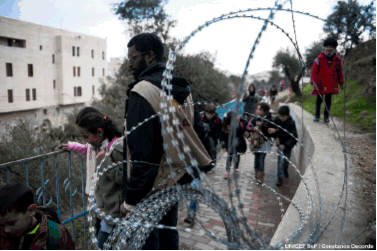Protective accompaniment helps children reach school safely in Hebron’s troubled Old City
By Catherine Weibel
|
|
HEBRON, State of Palestine, 23 March 2016 – For six-year-old Rana*, going to school every morning is stressful. The little girl, who lives next to a checkpoint, has to walk past several settlements to access her school in Hebron’s troubled Old City.
“I am scared from soldiers and settlers, they all have weapons,” the little girl shyly tells.
“At night, I can hear the sound of gunfire or sound bombs from my home, it’s scary. Sometimes I dream that settlers enter my school and destroy it. I feel safer at school than at home, because there are many students and teachers with me,” she adds.
Since 1997, Hebron has been divided into two parts. H1, home to around 140,000 Palestinians, is under the control of the Palestinian government; H2, inhabited by some 500 settlers and 30,000 Palestinians, is under Israeli military control.
“I AM AFRAID TO GO TO SCHOOL
” Established in 1971, Cordoba school is located in the H2 area of Hebron’s Old City, opposite the Israeli settlements of Beit Hadassah and Beit Romano established in 1979 and 1983.
The school was vandalized by settlers a number of times over the past years. Three incidents of interference with access to education were recorded in November; in December, Israeli Security Forces fenced off part of the school grounds with barbed wire.
All of the school’s 16 teachers and two-thirds of its 150 students — girls and boys age 6-16 — have to pass through checkpoint 56 which separates H2 from H1 every day. The closure of the checkpoint for renovations in December significantly increased their travel time as they were forced to take long detours through a Muslim cemetery or a muddy hill.
The presence of soldiers and armed settlers is intimidating for the children.
“We come to school as a group but I am still afraid because we walk past soldiers who have guns,” 12- year-old Ziad*, who lives close to the school, tells. “Sometimes they point their guns in our direction.”
Ziad is one of several students who experienced arrest.
“One evening, soldiers came to my house, broke the windows and arrested me,” he adds. “They said that a settler accused me of throwing stones. They kept me blindfolded for a few hours; in the middle of the night, they let me go.”
|
Palestinian students wait at checkpoint 56, which they have to pass daily to access Cordoba school. |
Studying and living in a military zone has negatively affected the children’s performance in school. Teachers say that many of them miss classes and suffer from psychosocial distress.
To help children feel safer, UNICEF supports a ‘protective presence and accompaniment’ in several locations of the West Bank, including Hebron.
PROTECTING CHILDREN, REPORTING ON VIOLATIONS
The programme, which helps students and teachers reach school safely past Israeli settlements and military checkpoints, is run in partnership with EAPPI (Ecumenical Accompaniment Programme in Palestine) and Christian Peacemaker Teams (CPT).
Their international volunteers walk children to school and report on education-related violations. This protective presence gives confidence and a sense of security to the students. It also helps reduce delays at Israeli military checkpoints and is known to deter settler harassment and violence.
The programme provides protection to more than 4,500 Palestinian children and 350 teachers who cross checkpoints daily, thanks to financial support from Mr. Wissam Al Mana.
“Children say they feel safer when they see us,” Ingrid, one of EAPPI’s volunteers, tells.
“Some students don’t want to go to school because they anticipate crossing checkpoints manned by soldiers where they experience bag checks, body search or delays. They also fear walking through streets prone to settler harassment and violence.”
Her job is not an easy one – some volunteers reported being harassed, threatened and sometimes physically assaulted by some of the settlers over the past months.
In recent months, the job has become even more challenging. Volunteers usually stand at checkpoint 56 and checkpoint 55, located on both ends of Shuhada Street, to offer a protective presence to students and teachers passing the checkpoints. Since October, Israeli authorities have declared large parts of Shuhada Street a “closed military zone.” This means that nobody except Israeli settlers, members of the Temporary International Presence in Hebron (TIPH), Palestinian residents of the street and children or school staff are allowed access.
MAKING A DIFFERENCE
International volunteers are no longer allowed to walk the children to and from school on Shudada street, increasing the risk of settler harassment and violence. They can only watch the students from a hill above Shuhada street, but remain present at the school and outside the checkpoints.
Despite the challenges, the volunteers continue to work and encourage children to go to school.
Palestinian students wait at checkpoint 56, which they have to pass daily to access Cordoba school.
|
Students in a classroom at Cordoba school. |
“Just seeing internationals around the school makes a difference, because children feel safer, they know they are not alone,” Lamia Tamimi, a teacher, tells.
Instead of turning back to go home, children continue to go to school. It is, after all, the school that gives each child a welcome sense of normalcy and provides them with the space they need to realize their full potential, imagine and hopefully build a better future.
______________________
* The names have been changed
Document Sources: United Nations Childrens Fund (UNICEF)
Subject: Children, Education and culture, Hebron, Occupation, Protection, Security issues, Settlements
Publication Date: 23/03/2016




